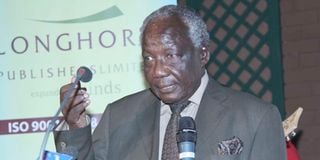Philip Ochieng was baddest of the bad-ass journalists

Philip Ochieng during the launch of his biography written by Liz Gitonga-Wanjohi at The Stanley on August 21, 2015.
What you need to know:
- You would never catch him without a book. His lunch companion was always a book, at the same time, same restaurant.
- He ate alone, reading, and it isn’t that he objected to company, it was just that he enjoyed his lunch more with a book than company.
At exactly 5pm, he would rise to his feet. A slim man without a speck of fat in his tall frame, immaculately encased in the best tailoring in the world, the suit — Savile Row, naturally — maybe grey pinstripe with a paisley handkerchief, his tie neatly clasped to his shirt chest high, his sleeves held back at the elbow with silver thingys, the cuffs never folded. You could apply makeup with his shoes, they gleamed like mirrors, Crocket & Jones maybe, the type that are made to fit and to last.
He would remove his glasses, allowing them to hang on his chest on their thong. His eyes dramatically on the ceiling, the very image of a great brain in full deployment, his left hand would be dangling over his heart, like a kangaroo’s short arm fondling a baby sac, his right twirling the grey hair at his temple.
He would march the entire length of the newsroom, turn on his heel and start back and then stop two paces short of my desk. By now, both hands would be retracted like two kangaroo short arms meeting over his sternum, the chest would pump out, the chin would smash down, his eyelashes beating a rapid tattoo, the eyes behind flashing mischief and laughter, like Morse Code lights on the deck of a ship in a dark night. Then he would bark: “Where is the editorial?” only he would pronounce it, “IDI-tori-AH” with a stubbornly African accent, not even the lightest hint of the years he had spent in the US in the 1960s.
This ritual played out at exactly the same time, five days a week for many years until I could “see” him with the back of my head, retract my arms, do the chest thing and demand the “IDI-tori-AH” in exact harmony with him. He, I and another character of an editor, Matthew Gathigira, did the same job. We were revisers, the last editors on a page before it went to press. But I was basically a kid while they were hard boiled veterans who had seen many things.
We didn’t just love him, we worshipped him. First, he knew everything. He had a thesaurus and a few editions of the dictionary on his desk and he used them. If you wanted to know the correct spelling or pronunciation of Valery Giscard d’Estaing, you shouted the question and he walked over to your desk, dictated the spelling and a lecture on French politics. In the world where tautology is a worse crime than murder, he was the encyclopaedia that kept you out of jail.
Master of the one-liner
Second, his wit was like a perpetual stream. We called him the master of the one-liner. His comebacks had no peer. When he rose uncharacteristically early one day, I shouted in surprise, “You are going home?” He stopped mid-track, thought about it for a beat and shot back, “Eventually”. And on another occasion he appeared in the office with his arm in a sling, his shoulder bandaged and bruises on his face. “What happened?” I asked in shock. He thought for a moment, then a wolfish grin split his battered face as he presented a full account of what he could recall: “It had something to do with whiskey.”
When he was writing or editing, he would march up and down, rehearsing the sentences, confirming the rhythm of the words, worrying and poking them until they were perfect. He would walk around, trying to get in trouble, pickpocketing other journalists and digging his hard, deformed fingers – after a lifetime of banging a manual typewriter, the last joint of his pointing finger could not extend – and he sometimes would pick the most fierce, stressed person around. It would all end in laughter and a fit of giggles.
Thirdly, he was a reader and generous with his books, at least to me. He would spend a whole decade reading one genre and he would read until there was nothing left to read. He introduced me to Frank Herbert, Isaac Asimov and a whole range of science fiction greats. We talked about Spice Melange, the Bene Gesserit and the search for the Kwisatz Haderach.
Lunch companion always a book
He, an atheist, introduced me to the early history of the Christian Church, the controversies of the Conference of Nicaea, the mysteries of the Red Sea Scrolls and the search for the Holy Grail. He introduced me to the genius of P.G. Wodehouse. You would never catch him without a book. His lunch companion was always a book, at the same time, same restaurant. He ate alone, reading, and it isn’t that he objected to company, it was just that he enjoyed his lunch more with a book than company.
Finally, he wasn’t just a left-brained person, he was a left AND right-brained person. Logical, analytical, clinical one minute, colourful, robustly creative and whimsically poetic the next. He judged and judged harshly and never refrained from expressing himself freely. There is a famous cartoon of his head on a platter I think by Maddo that I found in the newsroom.
Part comedian, part scholar, part dictator but a full-bloodied baddest of the bad-ass journalists: Philip Ochieng Otani (single L, no apostrophe and drop the last name).
What a guy.





